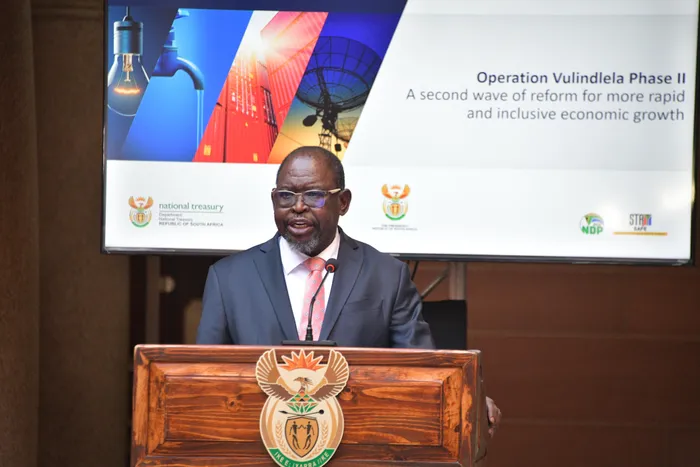
Minister of Finance Enoch Godongwana speaking at the launch of second phase of Operation Vulindlela in a bid to rejuvinate local government and the delivery of basic service delivery.
Image: GCIS
The South African government has decided to zero-in on municipalities in a bid to accelerate the implementation of structural economic reforms for inclusive long-term growth in the second phase of Operation Vulindlela.
Operation Vulindlela II, which was launched on Wednesday, will be focused on strengthening local government and improving the delivery of basic services, harnessing digital public infrastructure, and creating dynamic and integrated cities to enable economic activity.
Operation Vulindlela is a joint initiative of the Presidency and National Treasury to accelerate the implementation of structural reforms and support economic recovery by modernising and transforming network industries, including electricity, water, transport and digital communications.
The Presidency’s director of strategy Saul Musker said the deteriorating performance of local government was a major constraint on growth as it was affecting businesses and holding back investment.
Musker said the decline in local government performance was the result of both particular factors in each municipality, as well as structural causes that have their roots in the system itself.
He said the reforms proposed in OV II aimed to address those structural challenges, with local government being at the heart of the problem due to a lack of investment in infrastructure and maintenance.
“So the first priority that we've set out is to shift to a utility model for water and electricity services, in future also for waste management, but otherwise termed the trading services in local government, to ensure financial and operational sustainability,” Musker said.
“In simple terms, what this means is that at the moment, most municipalities, including most metros, have these functions fully integrated in the municipality. And that's quite different from how it looks in most other countries, where you've got professional utilities, water utilities, electricity utilities, delivering these services.
“What that means is they don't have control of the full revenue, the full value chain, from revenue and billing, through to asset management and maintenance, and operations, and they're not able to deliver a professional quality service. It also means that the revenue from those services, instead of being reinvested first in the infrastructure and the assets, is just sucked into the pool and used for other functions, compensation of employees, and so on.
“There's one, for example, major metro, one of the largest cities, where water revenues are close to R10 billion per annum, but the water function gets about 10% of that [and] the rest goes into the municipal revenue pool. And so the water network deteriorates.”
The first phase of OV was focused on implementing reforms to alleviate load shedding, improving the performance of the logistics system, reducing the cost of data, improving water supply, and enabling the country to attract the skills it needs.
National Treasury’s director-general, Duncan Pieterse, said the reforms already underway through OV Phase I will provide a significant boost to the economy in the medium term once fully implemented.
Pieterse said Phase II will therefore target both long-standing and emerging constraints on economic growth.
He said the new reform areas that matter for inclusion, resilience, and spatial equity, included strengthening the effectiveness of local government service delivery, especially in metros, leveraging digital public infrastructure to modernise State capabilities and unlock economic participation, and driving urban densification and spatial integration to reduce transport costs and connect people to opportunities.
“We are building on the lessons of Phase I and embedding clear theories of change for each reform area, setting measurable targets, and ensuring that coordination mechanisms—such as sectoral task teams—are fit for purpose. Crucially, we will expand access to technical expertise, both within and beyond government, and adopt a more dynamic approach to managing reform execution risk,” Pieterse said.
“Our challenge is execution at scale. We need to mobilise the full capacity of the State, crowd in the private sector, and create the conditions for markets to work more effectively. This means creating an enabling environment for investment into key sectors of the economy.”
Minister of Finance Enoch Godongwana said a commitment to swift implementation of reforms was required across government to lower the cost of doing business, reduce regulatory bottlenecks and provide policy certainty.
Godongwana said the immediate priority is therefore to sustain the momentum already developed and follow through on the implementation of existing reforms, in order to realise their full impact.
“However, other structural constraints to growth remain thus, additional reforms will be prioritised in the next phase of OV to promote higher and more inclusive long-term growth,” he said.
“The reform agenda will also prioritise (a) strengthening local government and improve the delivery of basic services; (b) harnessing digital public infrastructure as a driver of growth and inclusion; and (c) creating dynamic and integrated cities to enable economic activity.”
BUSINESS REPORT